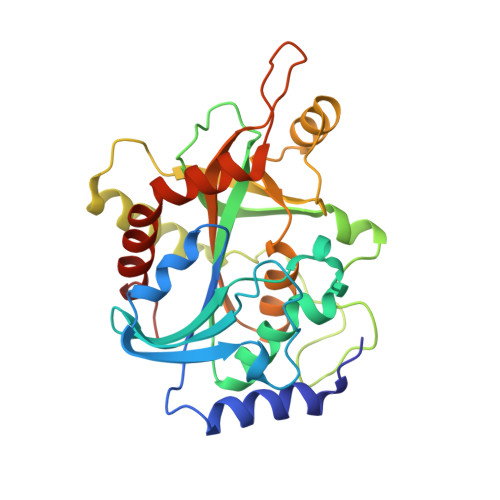Neighboring group participation in the transition state of human purine nucleoside phosphorylase.
Murkin, A.S., Birck, M.R., Rinaldo-Matthis, A., Shi, W., Taylor, E.A., Almo, S.C., Schramm, V.L.(2007) Biochemistry 46: 5038-5049
- PubMed: 17407325
- DOI: https://doi.org/10.1021/bi700147b
- Primary Citation of Related Structures:
2A0W, 2A0X, 2A0Y, 2OC4, 2OC9, 2ON6 - PubMed Abstract:
The X-ray crystal structures of human purine nucleoside phosphorylase (PNP) with bound inosine or transition-state analogues show His257 within hydrogen bonding distance of the 5'-hydroxyl. The mutants His257Phe, His257Gly, and His257Asp exhibited greatly decreased affinity for Immucillin-H (ImmH), binding this mimic of an early transition state as much as 370-fold (Km/Ki) less tightly than native PNP. In contrast, these mutants bound DADMe-ImmH, a mimic of a late transition state, nearly as well as the native enzyme. These results indicate that His257 serves an important role in the early stages of transition-state formation. Whereas mutation of His257 resulted in little variation in the PNP x DADMe-ImmH x SO4 structures, His257Phe x ImmH x PO4 showed distortion at the 5'-hydroxyl, indicating the importance of H-bonding in positioning this group during progression to the transition state. Binding isotope effect (BIE) and kinetic isotope effect (KIE) studies of the remote 5'-(3)H for the arsenolysis of inosine with native PNP revealed a BIE of 1.5% and an unexpectedly large intrinsic KIE of 4.6%. This result is interpreted as a moderate electronic distortion toward the transition state in the Michaelis complex with continued development of a similar distortion at the transition state. The mutants His257Phe, His257Gly, and His257Asp altered the 5'-(3)H intrinsic KIE to -3, -14, and 7%, respectively, while the BIEs contributed 2, 2, and -2%, respectively. These surprising results establish that forces in the Michaelis complex, reported by the BIEs, can be reversed or enhanced at the transition state.
Organizational Affiliation:
Department of Biochemistry, Albert Einstein College of Medicine, 1300 Morris Park Avenue, Bronx, New York 10461, USA.
















